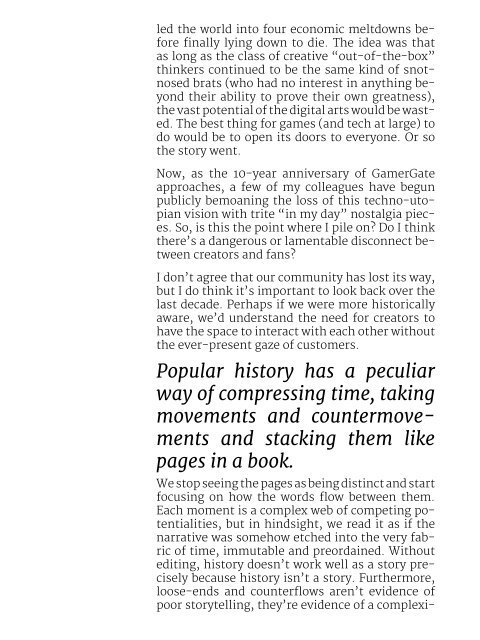Memory-Insufficient-spec-alt
Memory-Insufficient-spec-alt
Memory-Insufficient-spec-alt
You also want an ePaper? Increase the reach of your titles
YUMPU automatically turns print PDFs into web optimized ePapers that Google loves.
led the world into four economic meltdowns beforefinally lying down to die. The idea was thatas long as the class of creative “out-of-the-box”thinkers continued to be the same kind of snotnosedbrats (who had no interest in anything beyondtheir ability to prove their own greatness),the vast potential of the digital arts would be wasted.The best thing for games (and tech at large) todo would be to open its doors to everyone. Or sothe story went.Now, as the 10-year anniversary of GamerGateapproaches, a few of my colleagues have begunpublicly bemoaning the loss of this techno-utopianvision with trite “in my day” nostalgia pieces.So, is this the point where I pile on? Do I thinkthere’s a dangerous or lamentable disconnect betweencreators and fans?I don’t agree that our community has lost its way,but I do think it’s important to look back over thelast decade. Perhaps if we were more historicallyaware, we’d understand the need for creators tohave the space to interact with each other withoutthe ever-present gaze of customers.Popular history has a peculiarway of compressing time, takingmovements and countermovementsand stacking them likepages in a book.We stop seeing the pages as being distinct and startfocusing on how the words flow between them.Each moment is a complex web of competing potentialities,but in hindsight, we read it as if thenarrative was somehow etched into the very fabricof time, immutable and preordained. Withoutediting, history doesn’t work well as a story preciselybecause history isn’t a story. Furthermore,loose-ends and counterflows aren’t evidence ofpoor storytelling, they’re evidence of a complexi-


